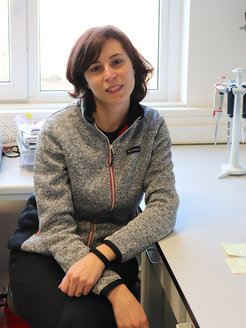Martina Cerise
Postdoc

- What fascinates you most about plant science?
Plants are very plastic organisms. They can perceive environmental cues and adapt their life and development to very different conditions. This behavior is perfectly regulated thanks to networks of genes that act together to ensure plant survival. I think that the synchrony between the perception of environmental conditions and genetic responses is something amazing!
- Tell us briefly what scientific questions you are pursuing at MPIPZ.
I study a developmental process called floral transition. Have you ever been in a park in the middle of spring? Were you ever curious about how all the plants around you could perceive the right time to start to produce flowers? Well, I am very curious about it! For this reason, I am studying how plants know when they should start to produce flowers, and which genes regulate this developmental process.
- What/who has inspired you greatly in your career so far?
What inspired me is the biological question that forms the basis of my research. Who inspired me is a very difficult question. During my studies from my bachelor degree until now as a postdoc, I have always been amazed by the passion that people have in doing science. In every laboratory in which I have worked from the very beginning of my scientific career, I have met people who are enthusiastic about research. This is something that makes me very happy and I am grateful to all the people I have known during these years, because all of them have in some way inspired me and motivated me to continue to unravel scientific problems.
- What do/did you find most challenging in your career so far?
I think that instability is the weak point of being a researcher. To be a scientist it is important to move to different cities and countries, and to travel to learn methods. This is exciting because you can experience different cultures and see many interesting places, but sometimes is hard to continuously move and be uncertain about your future.
- How do you see your future in science and why?
I really hope to continue my research and become a group leader one day. I still have many questions that I would like to answer and a lot of things I would like to learn. I hope that one day my research can contribute to knowledge about plant development and who knows – maybe it can help to solve some agricultural problems.
